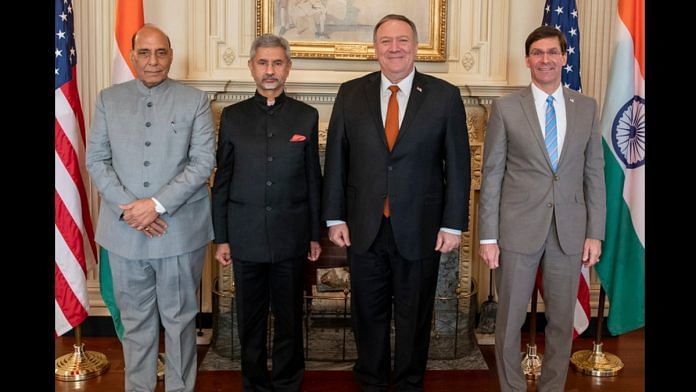New Delhi: US and India concluded the second round of their 2+2 dialogue in Washington Wednesday when both sides finally signed the much-awaited Industrial Security Annex (ISA) to boost defence cooperation between the two.
After the meeting at the Foggy Bottom headquarters of the State Department, US Secretary of State Mike Pompeo made an announcement to this effect.
Pompeo, along with Defense Secretary Mark Esper, hosted their Indian counterparts External Affairs Minister S Jaishankar and Defence Minister Rajnath Singh for the 2+2 talks. The first round of the talks was held in New Delhi in September 2018.
The ISA will ease transfer of high-level technology from the US to India and safeguard classified military information. The pact will also ease participation of American defence firms in ‘Make in India’ projects via the India-US Defence Technology and Trade Initiative (DTTI) that was established in 2012.
The DTTI was expected to propel defence purchases, amounting to around $18 billion, between India and the US. But the initiative failed to yield desired results in the past seven years. With the ISA becoming operational, however, the DTTI is expected to get a fresh lease of life, said sources.
Both nations are believed to have identified some new projects at a recent meeting of the DTTI that was held in Delhi last month.
“We have made substantial progress in the defence relationship,” said Esper, adding both sides are now moving ahead with the Communications Compatibility and Security Agreement (COMCASA).
The COMCASA was signed during the last 2+2 talks. This pact enables India to access advanced US defence systems such as armed drones that have been used with other American equipment.
The signing of ISA is also expected to facilitate the case of American defence giants Lockheed Martin and Boeing, which are looking at a $15 billion fighter jet deal to supply 114 warplanes to the Indian Air Force under the Make in India programme.
Lockheed Martin’s F-21 and F/A-18 Block-III Super Hornet of Boeing are the main contenders for the deal along with SAAB’s Gripen of Sweden and the French Rafale.
“The signing of ISA will smoothen transfer of defence technology. This will also push signing of pending defence deals worth around $30 billion in the coming decade between India and the US, especially the $15 billion fighter deal. Besides, now some of the COMCASA products (communication devices) can also be manufactured in India,” said Vikram Mahajan, Director (Defence and Aerospace), US-India Strategic Partnership Forum.
Cross-border terrorism, Pakistan’s compliance with FATF discussed
Indian and the US also discussed Pakistan’s compliance with rules and regulations laid down by the Paris-based financial watchdog Financial Action Task Force (FATF).
Pakistan faces an imminent risk of being blacklisted if it does not comply with all the rules of the FATF. The final assessment will be decided in the February plenary of the FATF.
“Our counterterrorism effort was also discussed at today’s meeting. And these have been boosted by a growing consensus on the nature of terror threats in the region, and the dangers of cross-border terrorism and sanctuaries. I appreciate very much the sentiments, expressed by Secretary Pompeo on the 11th anniversary of the 26/11 Mumbai attack. We discussed ways to address these challenges, including by working closely together at the FATF,” said Jaishankar.
US-India trade deal remains unfinished agenda
The much-awaited package on trade between New Delhi and Washington continued to hang in balance as both sides could not agree to a deal.
“We had a brief discussion on trade, and as all of you know, our bilateral trade has registered double-digit growth of late. We have noted very good progress. There are ongoing negotiations on the subject of trade, and I’m very confident that we’ll find a balanced outcome that satisfies both sides,” said Jaishankar.
Also read: US grants India ‘narrow exemption’ from sanctions to continue Chabahar port development in Iran



